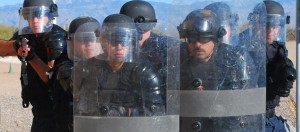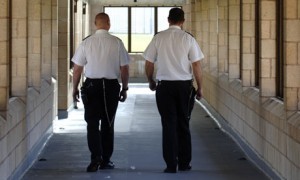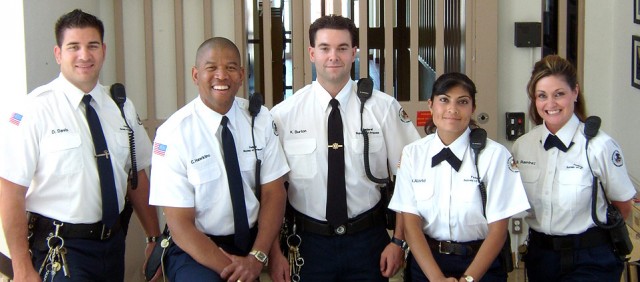The number one threat to a correctional officers safety isn’t the inmates they’re paid to oversee, it’s the actions of their fellow officers.
Respect is a two way street. To get respect, you have to give respect.
In the penitentiary any slight to another inmate is dealt with justly. Whatever the convicts code dictates is an appropriate punishment, the response will be merited out swiftly.
This is how we keep order behind these walls. Don’t say “excuse me” when you bump into someone, get a leather boot to the face. Cut in line, get a knife in your back. Whatever the case maybe, you know that however you treat your fellow prisoner can have serious ramifications on your well being.
 When it comes to interactions with officers, there is no even scale of balance.
When it comes to interactions with officers, there is no even scale of balance.
Even though we’re inmates, we’re still very much the people that cooked your food at a restaurant, or helped build your house. We just made a bad choice in life that we now have to make amends for. We weren’t “bad” people then, just like we aren’t bad citizens now.
But the distinction between a white cooks uniform, and a khaki prison ensemble makes all the difference in a world where ex-military officers and kids straight out of college are given unlimited freedom to impose their will.
The 1971 Stanford Prison experiment demonstrated that when your adults are given control over their peers, they will abuse that authority. The Abu Ghraib fiasco in 2003 further reinforced this credence.
Inmates are in prison AS punishment, not FOR punishment!
We have lost our lives, families, and friends because of our past actions. This is a burden we carry in our hearts and on our shoulders everyday. Every morning we wake up to a steel door being unlocked. A constant reminder, at the crack of dawn, of where we’ll be living for at least one more day.
As human beings, we have good and bad days. As prisoners we’re forced to live those days in a confined, overcrowded prison. Constantly on alert for random acts of violence that scars our consciousness, when it’s not traumatizing our bodies.
When we first become incarcerated the last thing on our minds is to take out our aggressions on an officer. There is a much more pressing issue we’re concerned with…survival!
But over the course of years, the inmates point of view slowly becomes redirected. The constant barrage of belittling and downgrading from a select group of officers, places a bulls eye squarely on the backs of ALL officers.
A human being can only endure so much before they reach their breaking point. One small, insignificant paper cut will never kill you. But if you’re inflicted with one, everyday, even Jesus would be frothing at the bit.
This is the reality that an inmate faces on a daily basis. At any given moment, on any given day, we can and are forced to strip naked in front of other men. Then the real humiliation begins.
After every orifice is spread open to satisfaction and some of our clothes are returned, then we’re locked inside of a room no bigger then a closet for hours on end. Half of the time standing in urine, with no shoes on mind you, from the prior inmate who couldn’t hold it any longer. This form of mental and physical degradation can occur for simply bringing a piece of fruit out of the chow hall on an officers bad day.
Officers are trained by fellow officers. They follow the example they’re given and then try to “one up” their fellow laborer.
 As inmates we can always tell how a rookie is going to turn out by their assigned trainer. If it’s someone that respects the inmates, then that’s how they become. If it’s the other end of the spectrum, they’ll only be worse than their indoctrinator.
As inmates we can always tell how a rookie is going to turn out by their assigned trainer. If it’s someone that respects the inmates, then that’s how they become. If it’s the other end of the spectrum, they’ll only be worse than their indoctrinator.
It is no coincidence that assaults of staff have risen [ 15% over the past ten years.] This number comes in direct correlation with the retiring of staff from the “rehabilitation” era of the 70’s and 80’s, and the new incumbent “incarceration” officers of the 90’s and 2000’s.
“Please” and “Thank you’s” are worth more than gold in a world of “Come here” and “Now” words.
Instead of investing [20%] of the BOP budget on Kevlar vests and extra staff to protect the officers, simply weeding out the “cowboys” and training the others in basic interaction skills would save enormous funds. Money that could be used on programs to keep inmates occupied and educating themselves to a future outside of the system.
If you like this check out The Politics of Programming in Prison



